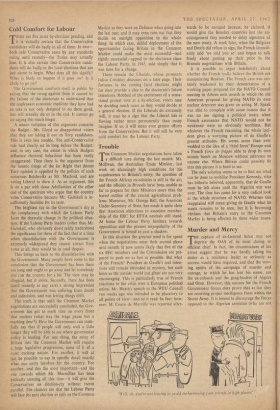Cold Comfort for Labour
lxERE are five more by-elections pending, and it is virtually certain that the Conservative candidates will do badly in all of them. In two— both safe Conservative seats by any standards ruling until recently—the Tories may actually lose. It is also certain that Conservative candi- dates will do badly in the local elections that are just about to begin. What does all this signify? What is likely to happen if it goes on? Is it likely to go on? The Government comforts itself in public by saying that the swing against them is caused by the failure of the electorate to understand that the unpleasant economic medicine they have had to take is not only designed to do them good. but will actually do so in the end. It cannot go on saying this much longer. A minor variation of this argument concerns the Budget: Mr. Lloyd so disappointed voters that they are taking it out on Tory candidates. This is even less tenable. The anti-Conservative tide had clearly set in long before the Budget; and, in any case, the extent to which Budgets influence electoral behaviour has been vastly exaggerated. Then there is the argument from the lunatic fringe of the far Right that decent Tory opinion is appalled by the policies of such notorious Bolsheviks as Mr. Macleod, and are voting Liberal to show it. As an argument, this is on a par with those Adullamites of the other end of the spectrum who argue that the country votes Conservative because Mi. Gaitskell is in- sufficiently Socialist for its taste.
The brightest ray in the Government's sky is the complacency with which the Labour Party faces the dramatic change in the political situa- tion. If the Labour Party leaders (other than Mr. Gaitskell, who obviously does) really understood the significance for them of the fact that at a time when dissatisfaction with the Government is extremely widespread they cannot attract Tory votes at all, they would be in total despair. This brings us back to the dissatisfaction with the Government. Many people have come to the conclusion that the Government has been there too long and ought to go away and let somebody else run the country for a bit. The view may be illogical, but it exists. Secondly, there has been (until recently at any rate) a strong impression that the Government was, suffering from doubt and indecision, and was letting things drift. The truth is that until the Common Market negotiations are successfully concluded, the Gov- ernment has got to mark time on every front that matters (what was the wage pause but a marking time?). Here the Goyernment can truth- fully say that if people will only wait a little longer they will be able to see where government policy is leading. For one thing, the entry of Britain into the Common Market will require a huge legislative programme, some of it of a most exciting nature. For another, it will at last be possible to say in specific detail exactly what our entry involves for the country. For another, and this the most important—and the one towards which Mr. Macmillan has been patiently steering all this time—it will give the Conservatives an election-cry without recent parallel. The chances are that the Labour Party will face the next election as split on the Common Market as they were on Defence when going into the last one; and it may even turn out that they decide on outright opposition to the whole thing. In which case, skilful deployment of the opportunities facing Britain in the Common Market could make the most successful—and rightly successful—appeal to the electorate since the Labour Party, in 1945, said simply that it was time for a change. There remain the Liberals, whose prospects Julian Critchley discusses on a later page. Their fortunes in the coming local elections might for once provide a clue to the electorate's future intentions. Robbed of the excitement of a sensa- tional protest vote at a by-election, voters may be deciding much more as they would decide at a general election. If the Liberals do extremely well, it may be a sign that the Liberal tide is flowing rather more permanently than many imagine. If so, it will mean even greater efforts from the Conservatives. But it will still be very cold comfort for the Labour Party.














































 Previous page
Previous page